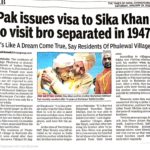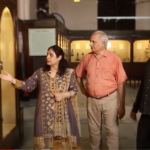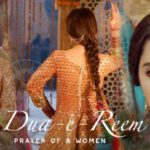Some unexpected discoveries by a group of 45 Pakistani students on a six-week long visit to India to experience the arts and culture and meet ordinary people…
Beyond ideas of national sovereignty, political disparities and partitioned borders, there lies a common link to identity – to our culture. The essence of an individual’s spiritual and intellectual belonging lies in the arts, heritage and tradition. It is human nostalgia for these that leads directly to our ancestors and beyond, to our ancient heritage.
This summer, I had the opportunity to connect with history when I participated in a six-week long mystical journey to India, in a group of 45 students from across Pakistan, accompanied by the talented classical dancer and activist, Sheema Kermani. The Society for the Promotion of Indian Classical Music And Culture Amongst Youth (SPIC MACAY) had invited us to attend their 3rd International Convention in Mumbai.
SPIC MACAY is a non-political voluntary movement in India that organizes events focusing on classical music and dance, folk arts, crafts, yoga, classic films, and heritage walks. The annual week-long Convention takes place in different cities of the country every year. SPIC MACAY provides board and lodging for participants; we were housed at IIT Mumbai. The turnout at the Convention is increasing annually; this year, some 1,800 people participated from around the world.
Before and after the convention our students’ group from Pakistan traveled to different cities of India besides Mumbai, including Amritsar and Delhi, trips organised by SPIC MACAY Pakistan delegation coordinator Harsh Narayan.
At the Convention in Mumbai, we participated in various intensive lessons — classical music instruments including tabla and sitar, qawwali, besides meditation and art forms like sculpture and calligraphy. Immersed in the diversity and rich, inspiring experiences, we felt like we had transcended into a world of mysticism.
We met people from various parts of India. Many spoke different languages, dressed differently, and adhered to different religions. Yet we always found more similarities in our lifestyles, norms and values than differences. We weren’t the only ones who felt like that. “All this while I compared Pakistan to Afghanistan and it turns out it’s just another India!” commented a Spic Macay participant from Delhi who met our group.
Meeting strangers, we were initially hesitant to reveal where we were from. However, once they learnt we were from Pakistan, the responses we got were very different than what we anticipated.
Contrary to what we had expected from media reports, we found that ordinary Indians really want to visit Pakistan. We were delighted at how curious they were about ordinary life across the border. We were surprised to see young individuals obsessing over ‘our’ stars Mahira Khan and Fawad Khan rather than ‘their’ Katrina Kaif and Hritikh Roshan. The older people spoke eagerly of their longing to visit the land of their birth and ancestors.
After a few such experiences, we started proudly sharing our nationality with people we met. Our interactions refuted the general misapprehensions that Indians and Pakistanis have about each other. Contrary to popular belief, we found ordinary Indians accepting and compassionate towards us.
On our travels we came across many domestic tourists in India, and found them keen to guide and befriend us. “Never thought I’d say this one day, but Pakistan has definitely made it to the top in my travel list,” commented a local train passenger from Amritsar after talking to us.
We connected with many via social media and other means of communication. In fact, this year on Pakistan’s Independence Day, we received more congratulatory messages from across the border than from our Pakistani friends.
One of the developing social changes we see today is the youth’s eagerness to question and reason independently rather than take a dogmatic, all-knowing approach. The Indians we met randomly demonstrated a critical analysis of why things are the way they are between India and Pakistan. Each individual had a different story to share and had a well-thought out opinion about Indo-Pak ties.
It was interesting to engage in these discussions on the ground, outside the virtual world, and to observe how people of the two nations are still intricately connected, nearly 70 years after independence and partition.
It is important to understand that people are still in the process of learning, in a process different from the orthodox discourse that breeds intolerance and rivalry between the two countries. People are still exploring, which means there are still many pages left unturned.
It was inspiring to see the amount of effort put into our visit by SPIC MACAY’s volunteer network and gurus who participated in the Convention to promote culture, arts and heritage nationally and internationally.
The performances and demonstrations by over 300 renowned artists and master craftsmen in a variety of fields — performing arts, music, film and theatre — also raised awareness and encouraged the youth to conserve and foster these values for future generations to witness. Several panel discussions enabled young participants to engage in quality dialogue about the significance of arts and culture to society. The event was also a great bridge between generations as senior members of the artists’ community interacted with young people. By acknowledging their work, as well as the contributions of past generations, the initiative infused inventive thinking and introduced a pioneering framework to promote culture.
We were acutely aware of the lack of such large-scale projects in Pakistan, but hope that the lessons we learnt from this opportunity will contribute to such efforts at home. The exchange of ideas, values and dialogue of this magnitude helps one grow as an individual as well as a citizen.
It is essential to promote and protect the field of arts, culture and entertainment in society, as this helps to stimulate social cohesion, embrace diversity and bridge differences. Pakistan needs to urgently develop a framework that not only invites people from other countries to visit and experience our traditions but to also allow citizens to embrace their own heritage.
Ramsha Jahangir is a social scientist and writer who believes in synchronicity and mindfulness.
















So happy to read this! Yes, contrary to the expected belief what the media usually leads us to. I am glad that you all enjoyed the stay here and have made it a point to tell the good stories hereon. Well written! This is just beautiful.
KEEP UP THE SPIRIT! I WISH I TOO COULD HAVE BEEN ONE OF THE PARTICIPANTS!